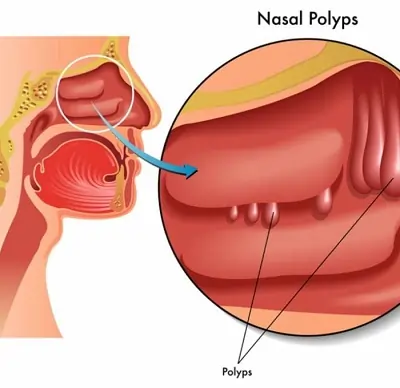Nasal Polyp Treatment in Ghaziabad
Best Nasal Polyp Treatment in Ghaziabad by Dr. Anuj Tyagi
Looking For the Best Nasal Polyp Treatment in Ghaziabad? When nasal polyps cause symptoms, including nasal congestion, breathing difficulties, and diminished sense of smell, they can significantly negatively influence a person’s quality of life. Nonetheless, efficient treatment choices are available to control this illness and reduce discomfort.
Dr. Anuj Tyagi offers insights into various nasal polyp treatment techniques in this thorough guide, from non-invasive procedures to surgical interventions. This article provides helpful information to assist you in making decisions on your Nasal polyp treatment in Ghaziabad, regardless of whether you have just received a diagnosis or are looking for alternative therapies.
Nasal polyps frequently grow in clusters, resembling grapes on a stalk.
Nasal polyps, called sinuses, are painless growths inside the nose or the hollow spaces inside the face’s bones. Nor are nasal polyps cancerous. Tiny nasal polyps could not show any signs. The nose can become blocked by larger growths or clusters of nasal polyps.

Nasal Polyp Treatment in Ghaziabad: Understanding Your Options
1. Therapies Based on Medication
Medication-based therapies are frequently the first line of defense when treating nasal polyps. The goal of these treatments is to lessen nasal polyp growth and inflammation. Typical drugs consist of:
Steroid Nasal Sprays: These sprays reduce swelling and congestion by directly delivering anti-inflammatory medication to the nasal passages.
Oral Steroids: In extreme circumstances, a prescription for oral steroids may be given to treat nasal polyp symptoms temporarily.
2. Modifications to Lifestyle
Specific lifestyle changes can help control nasal polyps and lessen the severity of symptoms in addition to medication. These could consist of:
Nasal Irrigation: Using a saline solution to rinse your nose regularly can help reduce congestion and remove mucus.
Avoidance of Allergens: You can lessen nasal irritation and the growth of polyps by recognizing and staying away from triggers such as pollen, dust, and pet dander.
3. Vaccine treatment
Immunotherapy or allergy shots may be advised for those whose nasal polyps are caused by allergic triggers. This treatment involves gradually exposing the body to tiny allergens to desensitize the immune system.
4. Medical Procedure
Surgical surgery may be required if nasal polyps are significant or do not respond to conservative treatment. Surgical alternatives consist of the following:
Endoscopic Sinus Surgery: This minimally invasive technique entails clearing out nasal polyps and enlarging the sinus openings to facilitate better airflow.
Polypectomy: A polypectomy may be carried out to remove nasal polyps while protecting the surrounding nasal tissue.
5. Biologic Therapies
Biologic medications target specific molecules involved in the inflammatory process, offering a more targeted approach to nasal polyp treatment in Ghaziabad. These medications are typically reserved for individuals with severe or recurrent nasal polyps who have not responded to other therapies.
6. Alternative Therapies
Some people may find relief from nasal polyp symptoms with alternative therapies, such as acupuncture, herbal supplements, or dietary changes. However, these should not be used in place of medical care. Before exploring these choices, speaking with a healthcare provider is imperative.
A thorough strategy catered to the specific requirements of each patient is necessary for the effective treatment of nasal polyps. In close collaboration with a medical professional such as Dr. Anuj Tyagi, patients can investigate different avenues of treatment and create a customized strategy for efficiently managing nasal polyps. Various methods exist to alleviate nasal polyp symptoms and enhance patients’ general well-being, including medication, lifestyle changes, and surgical procedures.
Nasal Polyp Treatment in Ghaziabad Without Surgery
- What are the main symptoms of nasal polyps?
Nasal polyps commonly cause symptoms such as nasal congestion, postnasal drip, facial pain or pressure, and reduced sense of smell.
2. Can nasal polyps be treated without surgery or Nasal Polyp Treatment in Ghaziabad without surgery?
Yes, many cases of nasal polyps can be effectively managed with medication-based therapies, lifestyle modifications, and immunotherapy without the need for surgery.
3. How long does it take to recover from nasal polyp surgery?
Recovery time from nasal polyp surgery varies depending on the type of procedure performed and individual healing factors. Most patients can expect to return to normal activities within a few days to a week after surgery.
4. Are nasal polyps a sign of cancer?
While nasal polyps are benign growths, they can sometimes be associated with underlying conditions such as chronic sinusitis or asthma. However, it’s essential to undergo a thorough evaluation by a healthcare professional to rule out any serious underlying causes.
5. Can nasal polyps come back after surgery?
Yes, nasal polyps can recur after surgery, mainly if underlying factors such as allergies or chronic inflammation are not addressed. Regular follow-up appointments with an ENT specialist are crucial for monitoring recurrence and adjusting treatment.
6. Is there a cure for nasal polyps?
While there is no permanent cure for nasal polyps, effective management strategies can help control symptoms and reduce the frequency of flare-ups. With proper treatment and ongoing care, many individuals with nasal polyps can experience significant improvement in their quality of life. Get Nasal Polyp Treatment in Ghaziabad
